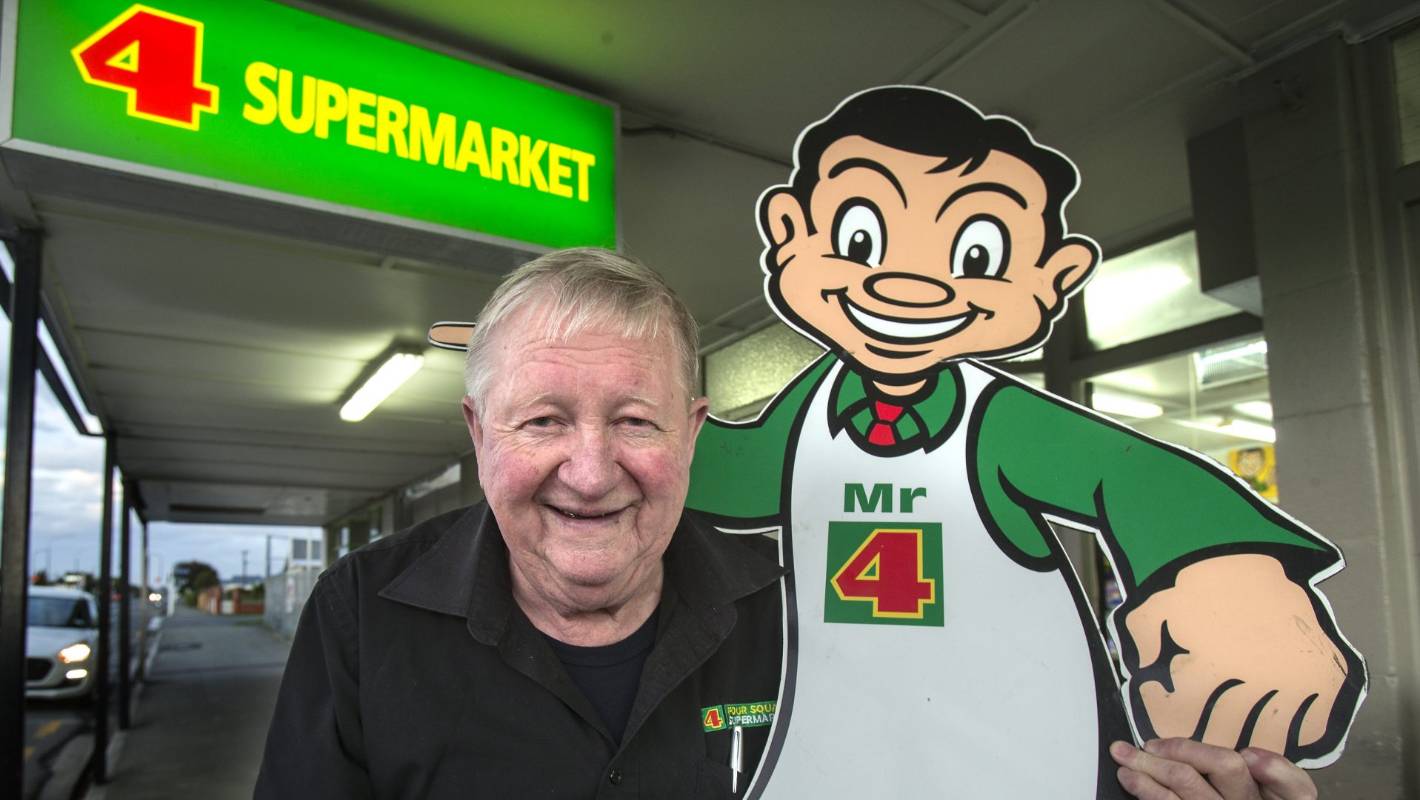COMMENT, Stuff, 3 November 2019.
What started as a way for independent grocers to fight supermarket chains has become a dominant force in its own right.
More than 95 years after Heaton Barker called a group of Auckland grocers together to form a co-operative buying block, Four Square supermarkets have spread nationwide. Four Square has weathered a world war, changing demographics and the arrival of technology. But the brand’s biggest challenge will be to stay relevant in the age of online shopping and food deliveries, said Foodstuffs South Island Four Square group manager Steve Alexander. “It’s about keeping up without going too far,” Alexander said.
Standing up for the independents
According to legend, Barker came up with the Four Square name in 1924 while on a call to a fellow grocer. In 1922, Barker had established a buying co-operative, later named Foodstuffs, after becoming concerned with the impact supermarket chains were having on small independent grocers. During the call he drew a square around the four on his calendar and realised he had a name for the buying group, later saying the group of independent grocers “would stand ‘Four Square’ to all the winds that blew”. In the early years, the Auckland-based group struggled to get hold of sugar, some brands of tea, soaps and even Edmonds baking powder because suppliers refused to recognise them as a wholesaler. However, by the mid-1930s, the company began to embed itself into the national psyche. “I don’t think that there is any one, single answer as to what has made Four Square successful but anything that makes it to 95 years in New Zealand, particularly in retail, is always going to be celebrated,” Alexander said.
The brand’s presence in rural communities has been particularly important to its longevity, he said. “Rural New Zealanders take ownership of anything in their community and the values Four Square set 95 years ago and are still in play today.” There are 241 Four Square stores nationwide, with 175 in the North Island and 66 in the South Island. In the last financial year four new Four Squares were added in the North Island, with one new store across the Cook Strait. Every Four Square is owner-operated, with stock, logistics and technical support coming from head office. Foodstuffs, which has brands including New World, Pak’n’Save, Gilmours and Liquorland — as well as Four Square — has 53 per cent of the grocery market in New Zealand, according to Canstar Blue. And it’s a profitable share, with the North Island half of the collective booking about $96.1 million for the financial year ended March 2019, while its southern arm reported net profit after tax of $8.1m for the same period. Spokeswoman Antoinette Laird said the co-op generally negotiated pricing and products on behalf of its stores. She declined to reveal the average annual turnover of a Four Square supermarket or how much it cost to buy one, citing commercial sensitivity. But a for sale Four Square and Lotto in Stratford, Taranaki, was recently advertised with an asking price of $620,000, with weekly sales of $48,000 plus Lotto.
Still pretty groovy
Brian Fraser and his wife, Trish, have owned the Four Square in Oamaru for 40 years, and the duo are currently the longest serving owner-operators. Fraser started with the co-operative in 1969, driving the tobacco van between Karitane and Twizel every week. Over time, he progressed from the tobacco service to warehouse buyer, and then an independent owner-operator. Owning a Four Square was “pretty groovy”, Fraser said. “All the years I have been here, I have enjoyed every day of it. We have staff that have worked for us for many years, my son works here and so does Trish, my wife.” Over the last four decades, the advent of technology had required the biggest adjustment for the Frasers. “It used to be that it was all pen and paper but now we have computers and all that stuff. Thankfully we have our son who is good at it.”
The size of Four Squares across the country varied massively. Four Square Darfield, opened in August is 1200 square metres, while Four Square Edmund Rd in Rotorua is 420sqm. In comparison, the about-to-launch New World Shore City Metro is 696sqm and the about-to-launch New World Pukekohe is 1689sqm just for the retail space.
A cult status
Marketing expert Ben Goodale said Four Square had developed a cult status because it spoke to a sense of what it was to be a New Zealander. “It has been around a long time and Kiwis have grown up with it,” Goodale said. “As a country that has come out of a rural farming environment [people] grew up going to Four Square. And even if they didn’t, whenever the went to the beach or go to the country, there’s Four Square. So it’s a real cultural touch point. Even the branding is beautifully simple and also really iconic.” Brands needed to remain relevant to survive, Goodale said. “Brands that struggle, it’s usually because they have either failed to connect to the evolving customer demographic. Or their product range isn’t as relevant to customer demands as it should be. Or, imported solutions are just more competitive.”
Four Square needed to ensure it was keeping up with customer expectations in terms of shopping experience and products, Goodale said. Laird said stores changed their look and fit-out in response to required refurbs, maintenance, to meet new brand standards or a deliberate do-up or new build to meet customer needs and the changing nature of the way people are shopping. “New stores in locations like Tekapo and Darfield are rolling out features like self-checkouts and using designer materials like tungsten steel,” Laird said. “Our Four Square Edmund Rd in Rotorua was recently damaged in a fire and the team has taken the opportunity to include new shelving and energy-efficient LED lights. The store installed a big commercial kitchen in 2018 which means they can create hot food options for customers looking for a grab and go meals.”
Nostalgia plays its part
Four Square icon “Cheeky Charlie”, also known as “Mr Four Square Man” was designed by the Foodstuffs advertising department in the 1950s. Lesley Jeffries, who owns the Tekapo Four Square with her husband, Russell, said nostalgia played an important role in the success of the Four Square brand. “If it wasn’t for Charlie, Four Square wouldn’t be Four Square. Charlie has been our mascot since day one,” Jeffries said. The image was used in print campaigns before being deployed into the stores across the country. Charlie has also been used by artist Dick Frizzell, and was most recently on the album of the Great New Zealand Songbook.
Frizzell told Stuff that Foodstuffs had contacted him about his use of Charlie in art. “I got a letter from Foodstuffs New Zealand worrying about their intellectual property being used in this way,” Frizzell said. “I wrote them a letter, which I kind of made up as I went, and it was all about, sometimes images break free of their designated role and float off into a cultural narrative, bigger than their original destination. “The boss wrote back, ‘ah, that’s cool, I like the idea of our guy being famous’, and they commissioned me to paint pictures of him.”
Community hub
The Jeffries are on the verge of selling the newly renovated Tekapo store to their son and his wife. “When we started off, we had just the basics plus the nuts and bolts. We used to sell nails and screws and kerosene by the bulk, all those old-fashioned things that you don’t sell in a grocery store anymore. Our motto was ‘Tekapo Services has it all’.” Since taking over the store in 1985, the couple’s business has steadily expanded. In 2017, they opened a modern building on the shore of Lake Tekapo. In a town with a permanent population of just 369, Four Square Tekapo caters predominantly to tourists. “But for me, Four Square is a family-orientated business. It’s a family business,” she said. Among the new owners is Four Square Parakai’s Daniel Dale, who has been in the business for less than four years.
Dale wanted to own a business from a very young age. At 21, he bought his first business driving a truck, because he couldn’t afford a supermarket. “Through a few good property transactions in Auckland, saving for a couple of decades and meeting the right person, by my mid-thirties I was in a position to buy a Four Square.” He and his wife, Diana, poured everything into the north-west Auckland store, and have seen a 50 per cent increase in sales. Success has come from getting to know the community and finding ways to support local groups, he said.
“We have added new departments, chicken and chips to the takeaways. We do hāngi on the weekend for locals, we do scoop ice cream. Just lots of little things like that,” Dale said. “We supply the two local schools with lunches now. Parents order through our website and we drop off the lunches. But for every parent who buys a lunch, we give a free lunch to kid who doesn’t have lunch at school.” Dale said the store was on track to give away 5000 lunches to students in Parakai and Helensville. The constant demands of the business was probably the biggest challenge of owning a grocery store, Dale said. “It sucks a lot of your time. Your family time diminishes and your weekends tend to disappear as there is always something to do.” Having a nine-to-five job and a four week holiday sometimes sounded appealing, he said. But Dale kept going because he liked the challenge and was looking for the future benefits. He also liked the freedom of being in control.
“I can have a sleepless night thinking about what people do and the next morning I can get up and do it.” Buying a Four Square takes time Laird said the process of becoming a Four Square owner took time. “There’s a very comprehensive process the business goes through to enable an owner-operator to move from one store to another,” she said. Prospective buyers needed to have proven business acumen, people skills and the ability to meet customer needs among other attributes. A committee then reviewed expressions of interest to decide who the approved purchaser will be. Once this was decided the person was then able to negotiate with the seller. Alexander, the South Island Four Square group manager, said the brand needed to keep doing what it did well. “We have had some staggering growth in the last 10 years. So, you keep doing what you do well and back a couple of conversations, making sure we keep up with trends like food to go and with accessibility in stores,” he said. “We are trying to do all the things we need to be to be modern, to meet customer expectations but at the same time giving that good old customer service that people love.”
This article was originally published on Stuff, November 03 2019. Author, Debrin Foxcroft.




